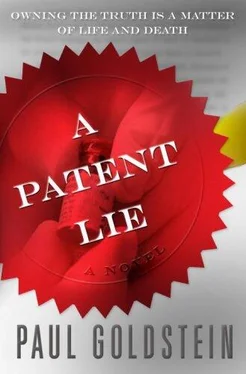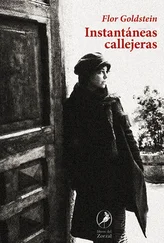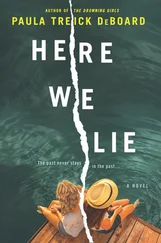Paul Goldstein - A Patent Lie
Здесь есть возможность читать онлайн «Paul Goldstein - A Patent Lie» весь текст электронной книги совершенно бесплатно (целиком полную версию без сокращений). В некоторых случаях можно слушать аудио, скачать через торрент в формате fb2 и присутствует краткое содержание. Жанр: Криминальный детектив, на английском языке. Описание произведения, (предисловие) а так же отзывы посетителей доступны на портале библиотеки ЛибКат.
- Название:A Patent Lie
- Автор:
- Жанр:
- Год:неизвестен
- ISBN:нет данных
- Рейтинг книги:3 / 5. Голосов: 1
-
Избранное:Добавить в избранное
- Отзывы:
-
Ваша оценка:
- 60
- 1
- 2
- 3
- 4
- 5
A Patent Lie: краткое содержание, описание и аннотация
Предлагаем к чтению аннотацию, описание, краткое содержание или предисловие (зависит от того, что написал сам автор книги «A Patent Lie»). Если вы не нашли необходимую информацию о книге — напишите в комментариях, мы постараемся отыскать её.
A Patent Lie — читать онлайн бесплатно полную книгу (весь текст) целиком
Ниже представлен текст книги, разбитый по страницам. Система сохранения места последней прочитанной страницы, позволяет с удобством читать онлайн бесплатно книгу «A Patent Lie», без необходимости каждый раз заново искать на чём Вы остановились. Поставьте закладку, и сможете в любой момент перейти на страницу, на которой закончили чтение.
Интервал:
Закладка:
“No,” Seeley said. “I'm not sure.”
“I'm not surprised,” Barnum said. “He reminds me of you.”
From inside the elevator, Thorpe looped his arm around the door, holding it open for Seeley and Barnum. Dusollier, already there, nodded at Seeley. Thorpe introduced the two strangers from the defense table, partners in a well-known Chicago intellectual property boutique. Seeley recognized the names-Witkin and Gallagher-from the depositions that he'd read while he was still in Buffalo. Under the fluorescent light, Thorpe's complexion was gray and mottled with age spots. High on each cheek was a scattering of hairs that the razor had missed, each as fine as an eyelash. Seeley studied the face for some evidence of what Thorpe might have been like as a younger man, something in the set of his jaw or a trace in his eyes that might betray a spark of wonder or curiosity, even will. But if a light ever burned in those dark, rimmed eyes, it had gone out long ago.
The elevator opened to the dimly lit lobby, and Thorpe waited for Seeley while the others walked to the double doors.
“Your reputation precedes you, Mr. Seeley-or may I call you Michael? I'm honored to be your adversary.” As in the courtroom the gravelly voice was reserved, even somber.
Seeley said, “I'm sure it will be an interesting trial.”
“It's a tragedy about Bob Pearsall.” Thorpe rested a hand on Seeley's arm. “Did you know him?”
Seeley turned to escape Thorpe's touch and said, “Did you?”
“How well do we know anyone?” When Seeley didn't respond, Thorpe said, “We had lunch from time to time. He was in a small poker group we have, some local trial lawyers. We get together once or twice a month.”
“What about his family?” Seeley was still unsure why Judy asked him, and not one of her husband's friends, to look into the police handling of his death.
“You mean the loving wife, the adoring daughter? Judy told me you've taken an interest in this.”
“Only because she asked.”
“Surely you've been practicing long enough to know how appearances can deceive. I've been married to the same woman for fifty-three years. My wife is my bridge partner, my life companion, and I devoutly believe that she has been faithful to me all this time. But do I really know that? Would I stake my life on it? Of course not.”
The privacy of the observation startled Seeley, but it was so offhand that he wondered if it was something Thorpe had said many times before, including to strangers.
At the security barrier, one of the guards greeted Thorpe by name, but he ignored it or didn't notice. Thorpe said, “So you don't think Bob threw himself in front of a train?”
“He took pictures of birds. He read philosophy.”
“Bob was a complicated man. He had his secrets.”
Seeley said, “But you're not going to share them.”
“If I did, they wouldn't be secrets.”
Seeley thought Thorpe would smile at his own remark, but he didn't. “What kind of poker player was he?”
“That's what I'm saying. You'd expect someone like Bob to be a methodical player, counting cards, figuring the probabilities, patient, like he was with those birds. But no, he was reckless. He'd bet every hand, so, even if you were holding pretty good cards, you wouldn't know whether to fold. Of course, he lost more than he won, but that never seemed to bother him.”
One the other side of the double doors, a chanting crowd with placards was gathered on the courthouse plaza. Television cameras moved around the protesters.
Seeley said, “What kind of poker player are you?”
Thorpe gave the question more thought than it needed. “Methodical. You could say I'm a methodical player.”
Thorpe had been playing poker with his peremptory challenge to the retired career counselor.
“And close to the chest?”
“Yes, that, too,”Thorpe said. “We should have lunch next week.”
Seeley said, “The week after would be better.”
“Of course, after you've put on your case. Our clients will want us to discuss settlement one last time.”
Thorpe went through the double doors-briskly, Seeley observed, shedding his courtroom torpor, making his way in the direction of the thirty or forty chanting protesters. One shook a placard at him, PILLS NOT PROFITS, but Thorpe moved past the crowd to where the news cameras and microphones were. Seeley knew that Thorpe wouldn't answer the reporters' questions so much as he would use the press to send Wall Street a message prepared by St. Gall's public relations and investor relations departments.
A slight-figured young woman in jeans, turtleneck, and down vest came up to Seeley, her hand outstretched.
“Michael Seeley? I'm Gail Odum from the Chronicle.”
The business reporter. For a disconnected moment, Seeley imagined that the stenographer's pad in her other hand was Pearsall's, and that she had found a notebook Seeley missed.
“What did Lily Warren tell you about your case?”
Seeley said, “You don't even know if I called her.”
“She told me you met, but she wouldn't tell me what you spoke about.”
Across the plaza, Thorpe was talking to a news crew, and several of the protesters had moved behind him to be on camera. Palmieri was a few feet away from the crowd, but Seeley couldn't see whether he was listening to Thorpe or talking to one of the protesters, a tall, rangy man with curly blond hair. When Seeley turned back to Odum, Barnum was coming toward him from the courthouse.
Seeley said to Odum, “Why would it matter to you, what we talked about?”
An automobile horn blared at the intersection, and Seeley didn't know if she heard him.
“I know that Lily and your inventor, Steinhardt, worked together at UC before they split up and went to work for competitors. Then your client sues St. Gall and she gets fired. It has to be connected to your case.”
The parties' stipulation on priority nowhere mentioned Lily's presence in Steinhardt's lab at Vaxtek, and Lily, desperate to keep her visa, would not have told Odum about the incident.
“Maybe it was a coincidence.” Seeley was aware of Barnum standing behind him, listening.
“Or,” Odum said, “maybe there's a romantic angle.” The reporter had a nice scent about her, nothing as intense as perfume-soap, maybe, or her shampoo.
Seeley said, “I'd think that would be for the gossip page, not the business section.”
Odum laughed. “At the Chronicle, the business section is the gossip page.”
She had a nice laugh, too, and Seeley guessed that she used it to pry out facts.
Trailed by a cameraman, the television newsman who had interviewed Thorpe was coming toward Seeley. Several yards behind, the tall curly-haired protester separated himself from the group and followed.
Seeley said to Odum, “If anything comes up that's newsworthy, and that I can give you, I will.”
Odum said, “On the phone, you promised that if I got Lily to call you, you'd give me an exclusive.” The smile looked genuine. “And let me decide whether it's newsworthy.”
As she went away, Barnum leaned into Seeley. “You didn't tell me you talked to the Chinese girl.” Seeley turned from the approaching television crew to keep the conversation private. Barnum said, “All you need to know is that St. Gall stipulated priority. You're running off in all directions. The Chinese girl. The police about Bob Pearsall. You've got a trial ready to start.”
“And, if Steinhardt is going to testify, I don't want any surprises.”
“What kind of surprises?”
“That's what I'm trying to find out.”
There was a clatter of equipment behind Seeley. “Jeff Fox, Counselor! KBAY television news!”
Seeley turned. The sprayed, blow-dried hair and unnaturally pink face gave the reporter the appearance of a heavily retouched photograph. Below the showy tie and jacket he had on worn jeans and scuffed running shoes, but the camera, just a few feet away, wouldn't catch them.
Читать дальшеИнтервал:
Закладка:
Похожие книги на «A Patent Lie»
Представляем Вашему вниманию похожие книги на «A Patent Lie» списком для выбора. Мы отобрали схожую по названию и смыслу литературу в надежде предоставить читателям больше вариантов отыскать новые, интересные, ещё непрочитанные произведения.
Обсуждение, отзывы о книге «A Patent Lie» и просто собственные мнения читателей. Оставьте ваши комментарии, напишите, что Вы думаете о произведении, его смысле или главных героях. Укажите что конкретно понравилось, а что нет, и почему Вы так считаете.












